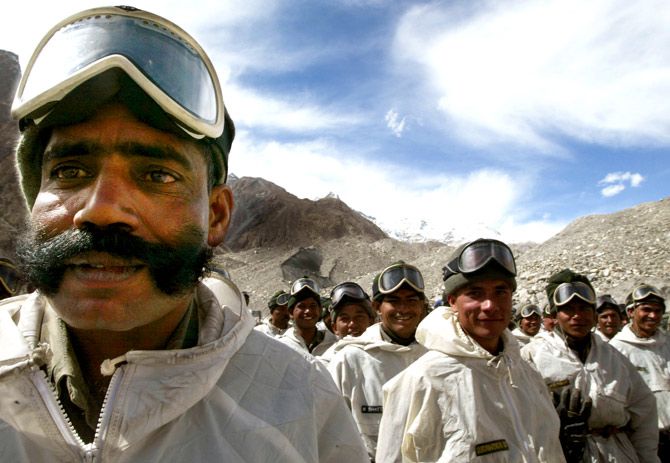Axiostat is a clinically-endorsed bandage to stop excessive blood loss.
Shameen Alauddin reports on the need to make it commonly available.

representational photograph: Pawel Kopczynski/Reuters.
During the surgical strike in 2016 along the Line of Control, bleeding control product Axiostat was used to sustain the life of an Indian soldier until a helicopter transferred him to a medical facility, claims Leo Mavely, founder and chief executive officer of Axio Biosolutions.
Founded in 2008, Bengaluru-based Axiostat is a clinically-endorsed bandage to stop excessive blood loss.
It recently raised $7.4-million in Series-B funding from Ratan Tata-backed UC-RNT Fund and existing investors Accel Partners and IDG.
Soon after, it received clearance from the Food and Drug Administration (FDA) to market its products in the United States.
The start-up also has a CE (Conformité Européenne)-approved mark to sell in Europe.
Concept
The main component of the product is chitosan, extracted by treating the chitin shells of shrimp and other crustaceans. Negative-charged blood components react with positive-charged Axiostat, forming a sticky substance that clots the blood.
Once the patient receives medical attention, the product can be removed by applying water. It absorbs the water to become a gel-like substance that can be peeled off.
In an emergency situation, the first 60 minutes is termed the 'golden hour'. It is within this time when it is critical that the victim has access to basic medical attention. In India, victims usually lack access to such care.
Of the top 10 common causes of death in India in 2016, road accidents, which often cause excessive bleeding, ranked eighth. These claimed 254,000 lives in 2016, up 22 per cent from 2005, according to the Global Burden of Disease Report, issued last September. Heart disease stood first.
Self-harm, which can cause bleeding, ranked 10th after 230,000 died in 2016, up 5 per cent from 2005, according to the report.
Axiostat can marginally fill these gaps if it expands into retail segments and sells its products directly to consumers. And, the company says its goal is to grab a place in everyone's first-aid kit.
Opportunity
"Uncontrollable bleeding is the major reason for deaths," says Mavely. "Whether in battlefields where 50 per cent of soldiers die due to uncontrollable bleeding and about 30 per cent of these deaths can be prevented, or road accident victims, where 40 per cent of deaths are due to bleeding out."
"Ambulances in India lack first-aid equipment and the skills required to start treatment before a patient reaches a hospital. Axiostat comes right at the interventional stage, to stop bleeding within two-three minutes of usage. In an accident, the dressing can give the victim ample time to reach the hospital for further treatment," he says.
The start-up currently caters to only four segments -- military, emergency, cardiovascular and dental.
The Indian military earlier used to import haemostats from the US but later switched to them, claims the firm.
It faces competition from global giants, the biggest being Johnson and Johnson.
Revenue
The price of each product varies depending on the segment it is being used in. While the dental variant costs ₹75, the military variant comes at ₹3,000-5,000.
Even after a decade of being in the healthcare industry and close to four years of launching its flagship product, Axio Biosolutions is yet to achieve break-even. It says it expects to do so in 18 to 24 months.
Beside the defence forces in India, the start-up has shipped around 350,000 units to 12 countries -- the United Kingdom, France, Poland, Bangladesh, Saudi Arabia, the UAE, Kenya, South Africa, Romania, Indonesia, Qatar and Oman.
It also supplies to medical institutions, such as AIIMS, Manipal, Apollo, Breach Candy and Fortis.
Road ahead
Mavely estimates the global haemostatic market at $3 billion and the Indian one at $400-500 million.
"We hope to be a ₹1-billion company by 2020, as we are registering 300 per cent year-on-year growth," Mavely says.
The start-up that manufactures the product in Ahmedabad recently increased its annual capacity to around 800,000 units.
"In the past few years, we have seen the company transform into a global player," says Avinash Raghava from Accel, one of Axio's investment partners.
The start-up plans to use the fund to build its footprint in Europe and America, and for new products in the advanced wound care segment.
In 2013, I met Leo, who briefed me about Axiostat and got me impressed with the product and its usage. To certify the product and its ability to be used in emergency medicine, we conducted the first clinical study for chitosan haemostatic dressings in India.
The product works soon after application and is simple enough to be used even by a layman to control bleeding. We found it very effective compared to other methods and most satisfactory in children, who tend to panic a lot. The results were promising.
Axio Biosolutions has also done a remarkable job by getting CE and FDA approvals. I think it is a first for an Indian product of this kind.
-- Ketan Patel, consultant & head of the emergency medicine department, Zydus Hospitals and Healthcare, Ahmedabad











